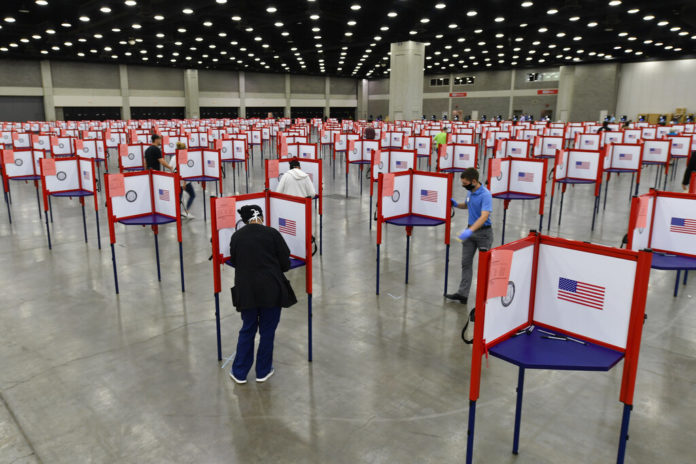
Arizona is allocating $9 million to protect voters and poll workers from the coronavirus in the upcoming election, the governor and a top elections official announced Thursday.
The money will allow counties to hire staff, increase curbside and early voting options, add ballot drop boxes and buy protective equipment, Gov. Doug Ducey and Secretary of State Katie Hobbs said. About $1.5 million will pay for an advertising campaign to inform voters about their options.
“From the start we’ve said that Arizonans should not have to choose between their health and their right to vote,” Hobbs said.
Arizona voters overwhelmingly cast their ballots by mail even before the pandemic raised concerns about congregating with strangers. Amid the outbreak, election officials have stepped up their pleas for voters to request a mail ballot, though their efforts could be hampered by President Donald Trump’s tweets claiming without evidence that vote-by-mail could lead to fraud.
“Arizona has a really good track record of voting by mail,” Hobbs said. “We’ve done it for a long time. The majority of our voters do choose to vote that way. It is a safe and secure method to vote. Our job is to make sure voters know that.”
Hobbs, a Democrat, and Republican Ducey encouraged people to bring their own masks and pens if they choose to vote in person. Still, the state plans to buy masks for election workers and voters, and face shields for workers, along with hand sanitizer, disinfectant spray and 10,000 disposable pens.
The money comes from the state’s share of federal coronavirus relief funding.
Hobbs tried unsuccessfully to convince state lawmakers to let counties send a mail ballot to every registered voter. Voting rights advocates have also called on lawmakers to extend registration deadlines and early-voting periods.
Election officials face a number of obstacles in planning to conduct a safe election amid the pandemic. They include finding polling places large enough to keep people separated, even as many traditional sites back out, and staffing polling places — a job done overwhelmingly by elderly workers who are most vulnerable to severe complications from the coronavirus.
Fears about the risks of in-person voting were realized in an April 7 election in Wisconsin, which brought long lines to some polling places. Dozens of people who voted contracted the coronavirus over the following two weeks, though several reported other possible exposures to the virus.
Monday is the deadline for voters to register for the Aug. 4 primary.
Republished with the permission of the Associated Press.












